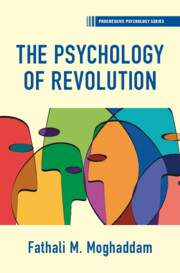Book contents
- The Psychology of Revolution
- The Progressive Psychology Book Series
- The Psychology of Revolution
- Copyright page
- Dedication
- Epigraph
- Contents
- Figures
- Preface
- Acknowledgments
- Chapter 1 A Psychological Perspective on the Puzzle of Revolution
- Part I Getting to Revolutionary Collective Action
- Part II Regime Change
- Part III What Happens after Revolutionary Regime Change?
- Part IV Reevaluating Revolutions
- Chapter 10 The Illusion-Motivation Model of Revolution
- Chapter 11 Does Human Nature Doom Revolutions?
- Afterword: Revolutions as Acts of Collective Creativity
- Notes
- References
- Index
Chapter 10 - The Illusion-Motivation Model of Revolution
from Part IV - Reevaluating Revolutions
Published online by Cambridge University Press: 07 March 2024
- The Psychology of Revolution
- The Progressive Psychology Book Series
- The Psychology of Revolution
- Copyright page
- Dedication
- Epigraph
- Contents
- Figures
- Preface
- Acknowledgments
- Chapter 1 A Psychological Perspective on the Puzzle of Revolution
- Part I Getting to Revolutionary Collective Action
- Part II Regime Change
- Part III What Happens after Revolutionary Regime Change?
- Part IV Reevaluating Revolutions
- Chapter 10 The Illusion-Motivation Model of Revolution
- Chapter 11 Does Human Nature Doom Revolutions?
- Afterword: Revolutions as Acts of Collective Creativity
- Notes
- References
- Index
Summary
The Illusion-Motivation Model of Revolution is presented in this chapter. The term “illusion” is not used here to suggest anything negative; it is simply referencing the normal human tendency to be influenced by illusions in everyday life. Five major illusions characterize the behavior of people engaged in a revolutionary movement. The supreme revolutionary illusion is the shared belief among those in a revolutionary movement that all of them will benefit in equal ways from the coming to power of the new revolutionary government. The illusion of unity results in differences within the revolutionary movement being overlooked. The illusion of rationality is in effect after regime change, and it is based on the assumption that a rational approach will yield the necessary positive results. The illusion of control characterizes the extremists who in the post-revolution period topple the moderates and come to power, believing that they can control and change mass behavior in line with their goals. Finally, the illusion of permanence is shared by extremist leaders and their regimes, in the belief that their revolutionary society will last forever.
Keywords
- Type
- Chapter
- Information
- The Psychology of Revolution , pp. 155 - 169Publisher: Cambridge University PressPrint publication year: 2024

